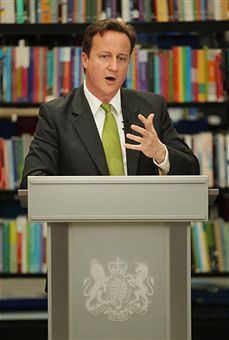 As Ben Brogan notes, there was a clean symmetry to David Cameron’s speech this
morning: the crisis was Labour’s fault; therefore, Labour is to blame for the painful measures needed to restore stability. As Cameron put it:
As Ben Brogan notes, there was a clean symmetry to David Cameron’s speech this
morning: the crisis was Labour’s fault; therefore, Labour is to blame for the painful measures needed to restore stability. As Cameron put it:
‘I think people understand by now that the debt crisis is the legacy of the last government. But exactly the same applies to the action we will take to deal with it.’
Cameron made constant reference to the actions of the ‘previous government’. As a foretaste of what the Independent Office for Budget Responsibility will expose, Cameron alleged that Alistair Darling withheld estimates that Britain will be repaying £70bn per annum in debt interest by 2015. He gave exhaustive examples of the systemic incompetence and waste that Labour oversaw in the public sector. He condemned Brown’s deliberate squeeze on the private sector and his illusory boom based on a housing bubble, public and household debt and immigration. It was a detailed catalogue of failure, and it should have been aired during the election campaign.
In an attempt to stem the unpopularity that awaits him, Cameron’s cuts will be delivered through the prism of Labour’s history. His central argument is that Labour ran a reckless structural deficit in the boom years. That is true, but canny Labour politicians will recall that their spending plans were matched as a matter of party policy by none other than David Cameron and George Osborne. Were they not complicit?
Yes, I would argue, but Labour will find no respite in that defence. Not only is it their mess, but the ground has shifted. The G20 have endorsed the Tories’ position and the Tories have finally escaped Gordon Brown’s rhetorical conceits about public spending. ‘Cuts Now’ is no longer a dirty refrain – it is uttered of necessity. Suddenly, Labour is isolated.






Comments